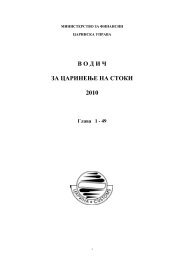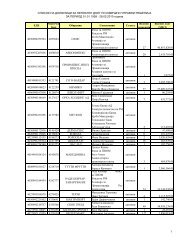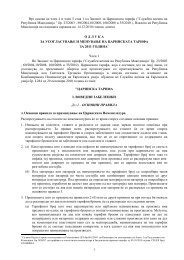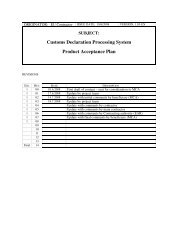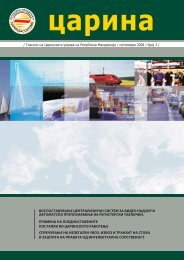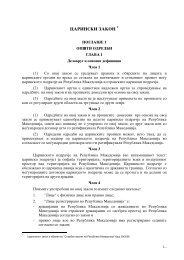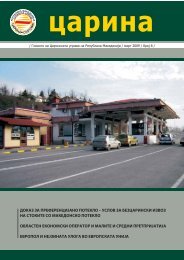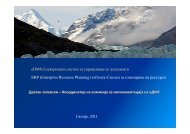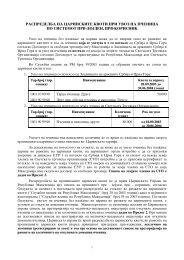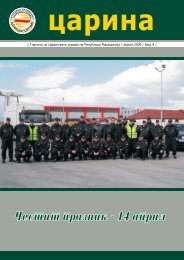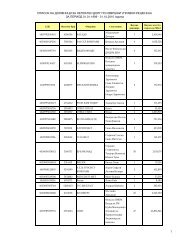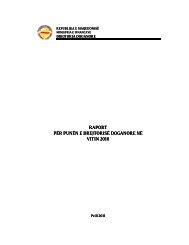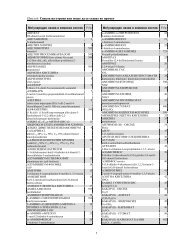Customs Declaration Processing System Detailed User and ...
Customs Declaration Processing System Detailed User and ...
Customs Declaration Processing System Detailed User and ...
You also want an ePaper? Increase the reach of your titles
YUMPU automatically turns print PDFs into web optimized ePapers that Google loves.
DETAILED USER & TECHNICAL REQUIREMENTS FOR CDPS<br />
AND USE-CASE MODELS<br />
Ref: PHASE V<br />
Number<br />
SR-0360<br />
SR-0370<br />
SR-0380<br />
SR-0390<br />
SR-0370<br />
SR-0380<br />
SR-0390<br />
SR-0395<br />
Description<br />
CDPS shall support the use of digital certificates for user authentication. CDPS<br />
shall keep a copy of the public keys of such digital certificates in its own<br />
repository.<br />
CDPS shall support the creation <strong>and</strong> verification of digital signatures based on<br />
the use of digital certificates.<br />
CDPS shall check the validity of digital certificates:<br />
• Check if the certificate is issued by an authorized Certificates Issuing<br />
Authority.<br />
• Check if the certificate has not expired.<br />
• Check if the certificate has not been revoked.<br />
CDPS shall keep a copy of public keys of expired digital certificates. This will<br />
allow for verification of digital signatures calculated in the past when the digital<br />
certificate was still valid.<br />
The system should lock a user account if 3 consecutive unsuccessful<br />
authentication attempts are made (wrong password was submitted for 3<br />
consecutive times). The user should not be able to log in the system when its<br />
account is locked. The account should be locked for a given period (at least 30<br />
minutes) of time <strong>and</strong> can be unlocked before this period only by user with<br />
special access rights (system administrator). There should be a possibility for<br />
configuring the locking period through a system configuration parameter.<br />
For security reasons user passwords should expire in a given period of time. The<br />
expiration period should be configured through a system configuration<br />
parameter. The user should not be able to log in the system if the password is<br />
expired. The system should prompt the user to change its password if it is<br />
expired. The system should not allow the user to reuse its previous passwords.<br />
<strong>User</strong> passwords shall satisfy minimum complexity requirements. For example,<br />
user passwords should be at least 6 characters long <strong>and</strong> should contain at least<br />
one digit or a non-alphanumeric character.<br />
CDPS must support single sign-on technology through LDAP (Lightweight<br />
Directory Access Protocol) communication with the Active Directory already<br />
implemented within MCA.<br />
Table 10: General security requirements<br />
5.2.5.2.1Common Domain Specific Requirements<br />
This chapter provides the additional security requirements for CDPS related to Common Domain.<br />
These requirements will need to be satisfied prior to the accession of Macedonia to EU. Security<br />
requirements should be implemented as recommended in the [A07]<br />
Number<br />
Description<br />
SR-0400 The “Security Policy Document” [A07] principles must be implemented.<br />
SR-0410 If a National Host is connected to a public network, a firewall should be put in<br />
place.<br />
SR-0420 Strong authentication CSI service should be used for the connection between a<br />
National Host <strong>and</strong> the CCN/CSI Gateway if it occurs through a public network<br />
<strong>and</strong> no firewall is used.<br />
SR-0430 In compliance with the DDNA (i.e. DDCOM, DDNTA, DDNXA, <strong>and</strong> DDNIA)<br />
specifications, all Common Domain messages must be acknowledged by their<br />
corresponding answer message or by an acknowledgement message.<br />
SR-0440 The NDI-WS workstation (internet workstation) must be physically<br />
Page 143/276



